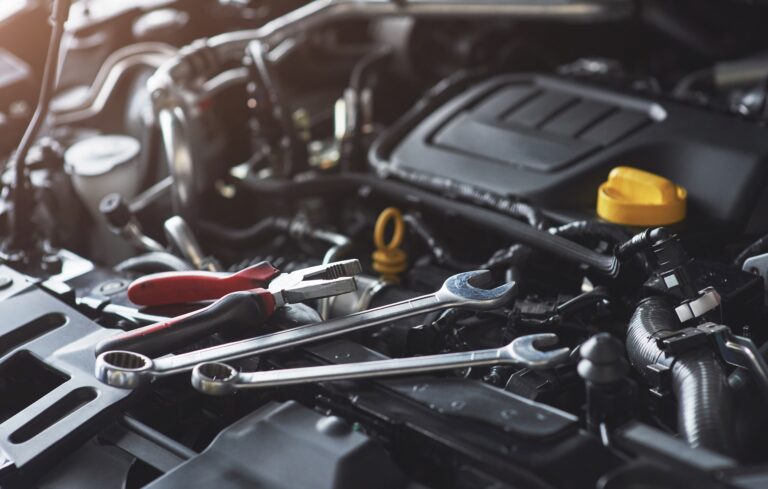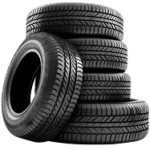UHP Tires vs All-Season Tires: Which Is Better?

If you don’t really think that much about the tires on your vehicle until it’s time to replace them, you’re not alone. Tires aren’t exactly a feature too many drivers put a lot of thought into. I mean, as long as they hold air and get you from point A to point B, they’re doing their job, right? While there’s nothing wrong with this mindset, it is important to have a general idea of what tires are on your vehicle and what you should look for when it’s time to replace them. Choosing the right tires for your vehicle is essential in keeping you and your passengers safe and your vehicle in optimal running condition. In this month’s blog, we’ll take a look at two common tire types: UHP tires and all-season tires.
What are UHP tires?
Typically found on high-end sports cars and a handful of premium editions of mainstream vehicles, UHP tires (or ultra-high performance tires) are designed to perform admirably at high speeds and can sustain torque and added horsepower better than standard tires. Most high-performance sports cars will come standard with UHP tires and those who like to “test the limits” of their vehicles as it were would likely notice a substantial difference in handling and dynamics. Just remember: always follow the rules of the road and stay safe, no matter what you’re driving.
UHP Tires Pros and Cons
There’s a reason UHP tires are found more commonly on high-end sports cars; they are simply better equipped to handle increased speeds, torque, and g-forces produced by the vehicle. They are built to dissipate heat and provide a better grip on surfaces both wet and dry. However, like any premium feature or accessory you might put on your vehicle, UHP tires are typically higher in price as compared to standard options. In addition, while UHP tires are built to withstand speed and torque, they are not built to last quite as long as all-season options. So you may be in the market for new tires sooner than you’d like.
What are all-season tires?
All-season tires are designed for safe and reliable performance throughout the year in, for lack of a better term, normal environments. The term “all-season” means that the tread and pliability of the tires perform well in hot (summer) and cold (winter) temperatures. It does not mean that these tires are equipped to handle blizzards and icy conditions on par with a set of snow or all-weather tires (they are not). All-season tires are the standard for most new vehicles with the notable exception of high-performance sports cars.
All-Season Tires Pros and Cons
Unless you reside in a climate with lots of snow and ice, you really can’t go wrong with a reliable set of all-season tires. All-seasons are built to handle any reasonable challenges the average motorist is likely to face on their commutes and they can certainly outlast UHP tires in terms of mileage providing you’re being responsible and not pushing your tires beyond their capabilities. Don’t think of all-season tires as the lesser option compared to UHP tires. Instead, they are designed for the average motorist and all things considered, most reputable all-season tires seem to get the job done quite well.
So which is better?
Unfortunately we can’t just come out and say one is better than the other. You’ll want to find the tire that is right for your vehicle, not necessarily the fanciest or most expensive tire on the market. That being said, if your vehicle rolled off the lot with UHP tires, then you’d be strongly advised to only use UHP tires for as long as you own the vehicle. Putting standard or all-seasons on a high-performance sports car could be bad news (your preferred tire retailer will almost assuredly share this stance). However, for the vast majority of people who just use their vehicles to get around town and aren’t necessarily looking for a “high-performance” driving experience, a sturdy and reliable all-season option is the more cost-effective, long-lasting, and dependable option. It just depends. In any case, you’ll want to do some research on your own and get in touch with a nearby tire & auto repair shop, they’ll help you find the tires that your vehicle needs at a price that’s fair.

Take it to telle
Stay Safe with a Tire Check from Telle Tire
Worried about your tread depth or tire condition heading into the summer storm season? Take it to Telle. Our expert technicians can assess your tires, check pressure levels, and recommend replacements when necessary, helping you stay in control regardless of the weather conditions. Stay safe, stay prepared, and if you’re unsure about your tires, schedule a visit with your nearest Telle Tire & Auto Centers location today.
Stay Informed
Recent Articles from Telle Tire

What Happens to Your Car When You Delay Scheduled Maintenance
It’s easy to push routine car maintenance down the to-do list. Oil changes, wheel alignments, tire rotations, fluid checks, battery tests, and suspension inspections often feel…

Winter Driving in Missouri: Top 7 Mistakes Drivers Make & How to Avoid Them
Winter in Missouri is anything but predictable. Drivers can experience early-season frost, freezing fog, sudden snow bursts, black ice on bridges, and wide temperature swings, sometimes…

Top Scenic Drives in Missouri This Winter
Winter transforms Missouri into a stunning landscape of snow-covered forests, frosted bluffs, quiet river valleys, and peaceful state parks. Whether you’re near St. Louis or Kansas…
